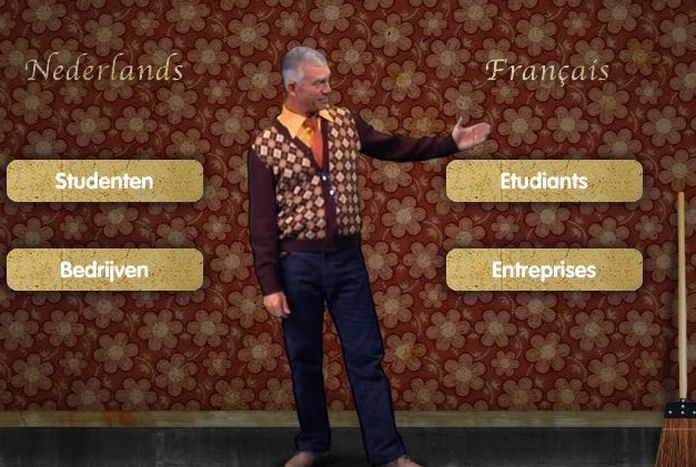
Brussels: a city of life-long interns
Published on
Translation by:
 rhiannon_nicolson
rhiannon_nicolson
We meet young foreigners in a capital full of multinationals, institutions and the need for multilingual interns
The Belgian capital declares to have a 35% unemployment rate amongst young people, but this figure is deceptive. The public administration in Belgium acknowledges the existence of the so-called ‘permanently unemployed’, i.e. young individuals which have been employed only briefly or university graduates who have never been employed. It is possibly a matter of location which hinders local young people when looking for permanent employment. However, in Belgium there is no corporation tax, thus attracting many non-EU companies to the country who want to set up a ‘base camp’ from which to conquer Europe.
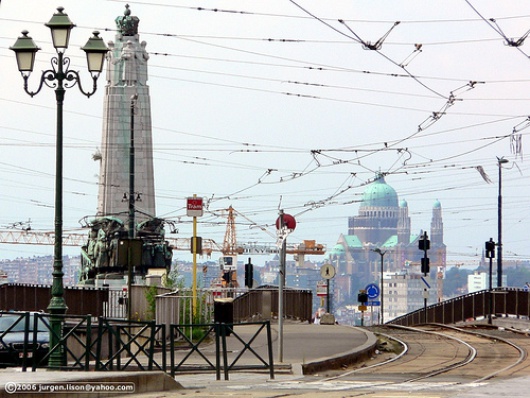 Matis Benelux works for a multinational company which does business in France, Spain, Morocco and Brazil. It’s one in a sea of consultancy companies in Brussels. The company specialises in advising businesses in the engineering sector and has more than 100 consultants currently working on construction sites around the country. 'We’re a medium-sized company and we’re looking to expand,' explains the human resources chief, Vanbeversluys. 'So we’ve launched a strategy to create a number of internships varying from six to twelve months in the department I head up, in finance and also in junior engineering, with the chance for individuals to become permanent employees at the end of their internship.'
Matis Benelux works for a multinational company which does business in France, Spain, Morocco and Brazil. It’s one in a sea of consultancy companies in Brussels. The company specialises in advising businesses in the engineering sector and has more than 100 consultants currently working on construction sites around the country. 'We’re a medium-sized company and we’re looking to expand,' explains the human resources chief, Vanbeversluys. 'So we’ve launched a strategy to create a number of internships varying from six to twelve months in the department I head up, in finance and also in junior engineering, with the chance for individuals to become permanent employees at the end of their internship.'
Websites advertising internships
Advertisements for internships are constantly multiplying on websites created specifically for those seeking internships with companies situated in Brussels. The most ergonomic of these sites is stageshopping.be which amongst humorous and ironic sections, daily displays hundreds of offers in the region. 'In the engineering sector we’re often forced to look for staff abroad, in countries such as France and Spain, as in Belgium there isn’t enough labour,' explains Vanbeversluys.
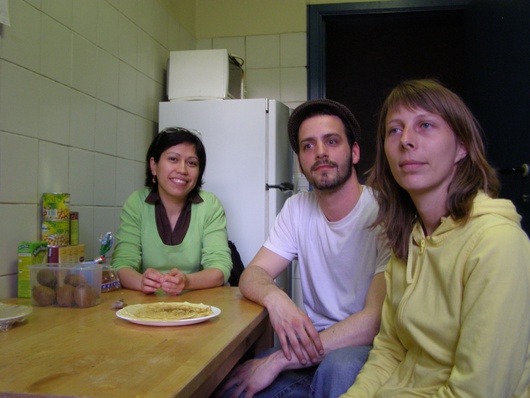 Amongst vats of butter, flour and boiling milk, three twenty-somethings are starting to unwind from the day at work by frying up a mountain of crêpes in the Van Gogh hostel in Brussels. Justine works at the Theatre des Martyrs as an assistant content programmer. Nils designs household objects powered by solar energy for Solarsolidarity, whilst Monia is employed in the human resources department for the European confederation of executives and management staff (also known as the CEC European Managers). Like all good Frenchies, they are eating at 8pm before heading down to the first floor where a concert of ethnic music is about to begin. This labyrinthic hostel by the botanical gardens is where all the grant recipients of the Eurodyssé programme in Brussels are housed. They are mostly Spanish, French and Italian: 'For this particular European capital there is only enough money available for twenty grantees a year,' admits Marie Rose Pétry, the head of the programme in Brussels.
Amongst vats of butter, flour and boiling milk, three twenty-somethings are starting to unwind from the day at work by frying up a mountain of crêpes in the Van Gogh hostel in Brussels. Justine works at the Theatre des Martyrs as an assistant content programmer. Nils designs household objects powered by solar energy for Solarsolidarity, whilst Monia is employed in the human resources department for the European confederation of executives and management staff (also known as the CEC European Managers). Like all good Frenchies, they are eating at 8pm before heading down to the first floor where a concert of ethnic music is about to begin. This labyrinthic hostel by the botanical gardens is where all the grant recipients of the Eurodyssé programme in Brussels are housed. They are mostly Spanish, French and Italian: 'For this particular European capital there is only enough money available for twenty grantees a year,' admits Marie Rose Pétry, the head of the programme in Brussels.
Currently 35 regions in Europe have jumped on the Eurodyssée bandwagon. The programme grants young people who want to spend six months as an intern in a foreign country 700 euros (£597) a month, which compares well with the unemployment benefits in their native countries. After six months 81% of the grant recipients will have found regular employment in their destination city.
Internships: simply a waste of time?
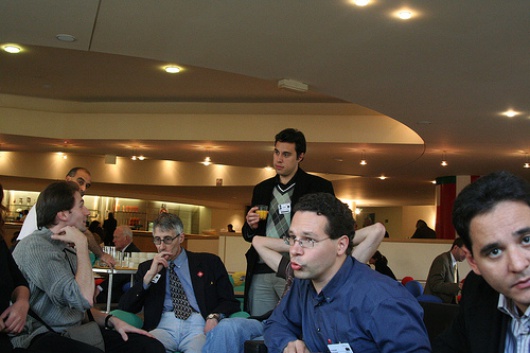 Let’s not forget that Brussels is also the capital of European politics, where the three main institutions - the European commission, the European council and the European parliament - have their headquarters, around which orbits a nebulous mass of media, lobbying groups and think tanks. 'All this serves to distort the reality of the situation for the young person who is seeking work or work experience and ends up wasting his or her time,' explains a civil servant working at Actiris, the Belgian public unemployment office, giving us an inside look into a world where figures regarding internships are often used to mislead the public. Antonio, a 23-year-old Spaniard, completed his degree in journalism in 2007 and already has three internships with the EU under his belt. 'However,' he concludes. 'I still don’t have any real prospects of finding steady work.' Amongst the European political parties, only the socialists guarantees financial benefits to its grantees.
Let’s not forget that Brussels is also the capital of European politics, where the three main institutions - the European commission, the European council and the European parliament - have their headquarters, around which orbits a nebulous mass of media, lobbying groups and think tanks. 'All this serves to distort the reality of the situation for the young person who is seeking work or work experience and ends up wasting his or her time,' explains a civil servant working at Actiris, the Belgian public unemployment office, giving us an inside look into a world where figures regarding internships are often used to mislead the public. Antonio, a 23-year-old Spaniard, completed his degree in journalism in 2007 and already has three internships with the EU under his belt. 'However,' he concludes. 'I still don’t have any real prospects of finding steady work.' Amongst the European political parties, only the socialists guarantees financial benefits to its grantees.
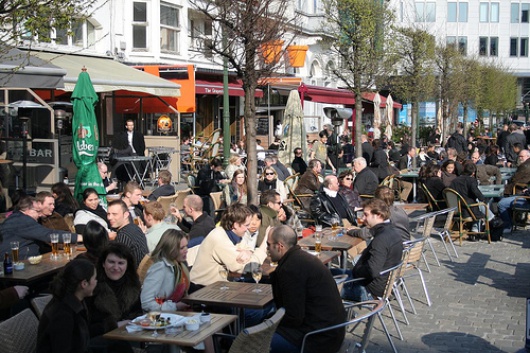 At Mickey Mouse – the main café in the European parliament which was once a sea of seats of all colours of the rainbow, and is now refurbished with fittings of a more functional nature and a more muted colour scheme – Claudio Scalese approaches us. Scalese is the president of EPSA, the grant-awarding association for the European parliament. With his robust 1.90 metre frame filling out a pin striped blue suit, his silver wristwatch and surfer-hippy wristband, the 26-year-old Calabrian is fighting for grant recipients to receive some of the basic rights which they are currently lacking: social security and a basic salary. 'Often grant recipients are over-qualified for the positions they are filling,' deplores one assistant for the Polish Euro MP Janusz Wojcheshowski, who gets paid according to the number of articles which he manages to get published. 'But not everything is astronomically expensive in the bubble.' He elaborates by holding out a leaflet announcing the weekly party with EPSA organises for its grant recipients. Happy Hour all night long! he exclaims and heads off back to work with a pile of papers under his arm.
At Mickey Mouse – the main café in the European parliament which was once a sea of seats of all colours of the rainbow, and is now refurbished with fittings of a more functional nature and a more muted colour scheme – Claudio Scalese approaches us. Scalese is the president of EPSA, the grant-awarding association for the European parliament. With his robust 1.90 metre frame filling out a pin striped blue suit, his silver wristwatch and surfer-hippy wristband, the 26-year-old Calabrian is fighting for grant recipients to receive some of the basic rights which they are currently lacking: social security and a basic salary. 'Often grant recipients are over-qualified for the positions they are filling,' deplores one assistant for the Polish Euro MP Janusz Wojcheshowski, who gets paid according to the number of articles which he manages to get published. 'But not everything is astronomically expensive in the bubble.' He elaborates by holding out a leaflet announcing the weekly party with EPSA organises for its grant recipients. Happy Hour all night long! he exclaims and heads off back to work with a pile of papers under his arm.
Readmorefrom the cafebabel.com local hub in Brussels
Translated from Bruselas en prácticas de por vida


